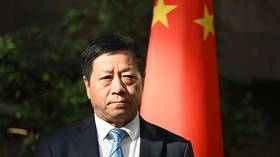[
Beijing has long opposed Washington’s military support for Taipei, seeing it as a violation of the One-China principle
Taiwan plans to deploy new US-supplied missile defense systems by the end of the year, the Ministry of National Defense announced on Friday, as cited by Taipei News. The Norwegian-made Advanced Surface-to-Air Missile Systems (NASAMS) will be installed in strategically significant locations in the north of the island, including Taipei’s Songshan District and New Taipei City’s Tamsui District.
NASAMS, a mid-range air defense system, can engage aircraft, unmanned aerial vehicles, and cruise missiles. It integrates advanced radar technology and a military tactical data link to counter aerial threats. The US Defense Security Cooperation Agency approved the sale of three NASAMS to Taiwan as part of a $2 billion arms package announced in October last year, which marked the 17th arms sale to Taiwan under US President Joe Biden’s administration.
According to the Taiwanese Defense Ministry, the deployment is part of efforts to strengthen air defense capabilities in response to increased Chinese military activity in the Taiwan Strait. The NASAMS systems will complement existing air defense platforms, including the Tien Chien II (Sky Sword II), Tien Kung (Sky Bow), and Patriot Advanced Capability-3 (PAC-3) missiles.
Taiwan has also signed contracts for L-band and non-L-band electronic array radar systems, designed to improve detection rates and resist jamming, the ministry said. These radar systems will be distributed nationwide, providing comprehensive coverage. The ministry reported that NT$24.3 billion ($737 million) has been allocated for the NASAMS and radar contracts.
The announcement comes as tensions continue between Beijing and Taipei over Taiwan’s political status. China views the self-governing island as a breakaway province and has vowed to reunify with it, including by force if necessary. Taiwan rejects Beijing’s claims and insists upon its sovereignty. The government in Taipei has condemned Beijing’s frequent military drills near the island as provocative and detrimental to regional peace.
While the US officially adheres to the One-China policy, recognizing Beijing’s claim to Taiwan, it has maintained robust military support for the island. In December, the US Senate approved a $895 billion defense bill that included numerous measures intended to bolster military support for Taipei.
Beijing has strongly opposed US actions, imposing sanctions on seven US defense companies in December 2024 and banning sales of dual-use products to 28 American military suppliers earlier this month, citing violations of the One-China principle.
You can share this story on social media:




